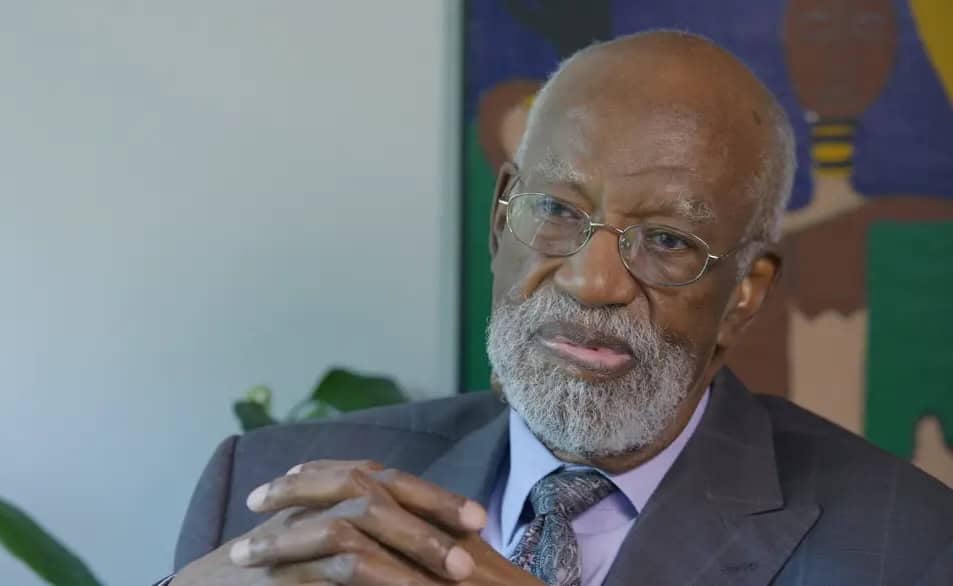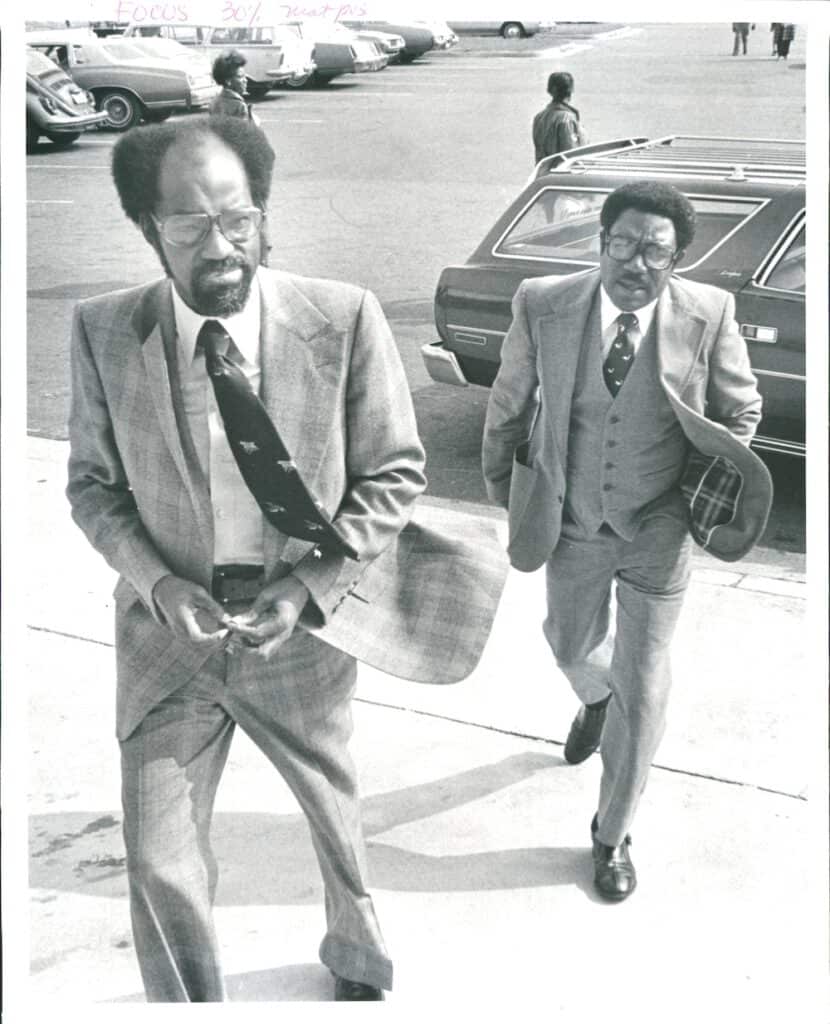
The Legal Defense Fund (LDF) deeply mourns the loss of James E. “Fergie” Ferguson II, the legendary and pioneering civil rights champion whose extraordinary legal advocacy reshaped the fight for racial justice in North Carolina and beyond. Throughout his remarkable life and career as a civil rights attorney and steadfast advocate for justice, Ferguson maintained an indelible commitment to dismantling systemic barriers and creating lasting change, leading on a wide range of issues concerning desegregation, education equity, voting rights, and death penalty reform. Mr. Ferguson passed away on July 21, 2025, at 82 years old.
“With heavy hearts, we mourn the loss of James ‘Fergie’ Ferguson—a dear friend, a trusted colleague, and an inspiring pillar of the civil rights community. A towering luminary of legal brilliance, relentless advocacy, and unshakeable purpose, Fergie was someone who lived his commitment to justice every day both in the courtroom and beyond,” said LDF President and Director-Counsel Janai Nelson in a statement following Mr. Ferguson’s passing. “LDF is profoundly grateful for his partnership, his generosity, and enduring spirit over the years. Our deepest condolences and sympathies are with Fergie’s family, loved ones, and all whose lives he impacted. We are forever touched and inspired by his lifelong dedication to justice, a shining example that will continue to guide and strengthen us in the formidable fight ahead. Rest in praise and power, Fergie.”
“‘Fergie’ was the model of a superb civil rights lawyer. He was a brilliant strategist and litigator. But he also modeled the kind of lawyering that put clients first, and that drew from a wide range of skills and disciplines to problem-solve for the communities he served,” said Sherrilyn Ifill, LDF’s seventh President and Director-Counsel. “With his dear friend and partner Julius Chambers, LDF’s third Director-Counsel, and attorney Adam Stein (father of North Carolina’s current Governor Josh Stein) – Fergie co-founded the first racially integrated law firm in the South. At that firm, which became legendary within the civil rights legal community, Fergie spearheaded desegregation work in North Carolina, including the landmark case Swann v. Charlotte-Mecklenburg School Board, and worked at the forefront of efforts to advance death penalty reform. Over decades, Mr. Ferguson mentored generations of LDF lawyers, serving as cooperating counsel on a wide range of civil rights cases. Fergie was beloved. His warmth and generosity as a colleague and as a leader were unmatched. He was one of a kind. In recent years, Fergie has generously hosted LDF’s Marshall-Motley Fellows each summer, sharing his wisdom and encouragement to a generation of future civil rights lawyers. Fergie will be deeply mourned and missed.
“Attorney James E. Ferguson II, affectionately and widely known as ‘Fergie’, had a tremendous impact on the development of modern civil rights law,” said Elaine Jones, LDF’s fourth President and Director-Counsel. “Fergie poured his heart into his calling as a civil rights attorney and was focused on developing a legal infrastructure that would recognize the humanity of people of color and equally apply the law to them. For nearly six decades, he worked with the Legal Defense Fund to develop the body of law we must defend yet again. His clients, students, colleagues, friends, and LDF stand on his shoulders. We will always remember his brilliance, his determination, his grace, and his commitment.”
“Fergie was a legendary figure in civil rights who walked every step with the passion, the dedication, and the fortitude needed to truly meet these challenges head-on and advance racial justice,” Ted Shaw, LDF’s fifth President and Director-Counsel. “Fergie rooted his life’s calling in uplifting others through advocacy, litigation, and mentorship—and it is through this that he helped so many of us rise. He will remain in our hearts as a friend, partner, and inspiration to LDF and all the lives he touched. We’ll miss you, Fergie.”
James E. Ferguson II was born in 1942 in Asheville, North Carolina into a working-class family of seven siblings. Growing up in a deeply segregated town against the backdrop of Jim Crow, Ferguson witnessed the widespread impacts of racism in his local community. When the Brown v. Board of Education ruling came down in May 1954, Ferguson heard the decision as an eighth grader on the car radio while helping his teacher run errands. In an interview for Recollection, LDF’s civil rights legal archive, Ferguson noted how excited he was about the decision at the time. While the ruling didn’t lead to instant change, he said it inspired him to become deeply involved in community activism to make racial equality a reality.
Ferguson attended the all-Black Stephens-Lee High School, where he co-founded the Ashville Student Committee on Racial Equality (ASCORE), a student chapter of CORE, with his classmates. Through steadfast advocacy, the group successfully organized campaigns protesting segregation at various public facilities in Asheville, including libraries, parks, and lunch counters. As ASCORE’s first president, Ferguson attended a founding meeting of the Student Non-Violent Coordinating Committee in Raleigh, North Carolina in 1960. Ferguson’s mentors, including local Black lawyers Ruben Dailey and Harold Epps, encouraged him to consider studying law.
After graduating high school, Mr. Ferguson enrolled at North Carolina College for Negroes, now known as North Carolina Central University. He became student body president and received his bachelor’s degree in 1964. Ferguson then furthered his studies at Columbia University Law School, graduating with his J.D. in 1967. There, he also met fellow student and young LDF intern, Julius Chambers — a connection that would blossom into a vibrant friendship and historic partnership. Ferguson settled in Charlotte, where became a founding partner at North Carolina’s first racially integrated law firm, Chambers, Stein, Ferguson, & Lanning, with Chambers, who went on to become LDF’s third President and Director-Counsel. In an interview with LDF, Ferguson reflected on his commitment to practicing law in the South. “I knew from the beginning, from the day I walked in, applied to that law school, that my purpose was to go back South,”he said.
A pioneering legal mind whose work spanned more than five decades, Ferguson’s exceptional mastery of the law and unwavering commitment to justice led to securing victories that would leave a lasting impact on the entire nation. Ferguson argued Swann v. Charlotte-Mecklenburg Board of Education before the U.S. Supreme Court alongside Julius Chambers, establishing busing as legal and effectively mandating school integration nationwide. Ferguson argued Thornburg v. Gingles, which played a significant role in interpreting the Voting Rights Act of 1965. Ferguson also led the defense of the Wilmington Ten and secured their pardons forty years later. Ferguson served as co-counsel on numerous civil rights cases with LDF, including in voting rights, death penalty reform, and education equity.

During South African apartheid, Ferguson was a powerful advocate for justice as a co-founder of South Africa’s first Trial Advocacy program, for which he also served as a coordinator and faculty member. South African President Nelson Mandela highly regarded Ferguson and in 2009 noted the significant impact of the program stating, “These men and women are the heroes of yesterday and the hope of tomorrow. I salute them.”
In 2019, Ferguson successfully argued North Carolina v. Augustine before the North Carolina Supreme Court as part of the historic defense of the Racial Justice Act of 2009 (RJA), which the North Carolina Legislature attempted to retroactively appeal in 2013. The Court ultimately vacated Augustine’s death sentence and allowed all RJA claims filed before 2013, including those filed by almost the entire North Carolina death row, to move forward.
“As part of the group of lawyers defending the Racial Justice Act before the North Carolina Supreme Court, I had the great privilege of witnessing Mr. Ferguson’s argument in person,” said Jin Hee Lee, LDF Director of Strategic Initiatives. “From the podium, he mesmerized the courtroom by expertly arguing the law and alsoexplaining racism in North Carolina from the vantage point of someone who personally experienced Jim Crow. His lifelong civil rights career impacted not only his clients, but also the lives of Black people across North Carolina and the entire country.”
Ferguson was a staunch and vocal supporter of LDF’s Marshall-Motley Scholars Program, seeing in it the promise of the next generation of civil rights lawyers to carry forward the torch of pursuing equality and justice in the South. He dedicated time and care to mentoring young legal minds, offering not just his wisdom, but his example — rooted in courage, clarity, and an unshakable belief in the power of the law to uplift communities and challenge inequality.
In a 2024 interview with Recollection, Ferguson reflected on the profound significance of resilience in the face of adversity. “We like to believe, in spite of some things we see today, that we’re still moving in that direction to bring about what the Legal Defense Fund has been about for decades,” he said. “We see progress and then we see retrogression in whatever that progress has been, but we still come back and find ourselves pushing towards that society, which is going to come one day, where every citizen is judged by the content of his or her character and not by the content of his or her color.”
Mr. Ferguson received national recognition throughout his career, including being named among The Best Lawyers in America for decades and featured by The National Law Journal as one of the country’s top ten litigators. He was known locally as “The Lawyer Lawyers Come to See,” honored as a Super Lawyer, and selected for the prestigious Inner Circle of Advocates—an exclusive group of the nation’s top 100 plaintiffs’ attorneys.
Mr. Ferguson is survived by three children, four grandchildren, and two great-grandchildren. His beloved wife of 56 years, Barbara Turman, a fellow Asheville native and ASCORE’s third president , preceded him in passing in 2022. Mr. Ferguson will forever be cherished in the memory of those who knew him. His unwavering pursuit of justice continues to light the path for future generations, reminding us that the struggle for racial justice is not only necessary, as Ferguson noted, but also deeply rooted in hope, dignity, and the belief that a more just society is possible.
